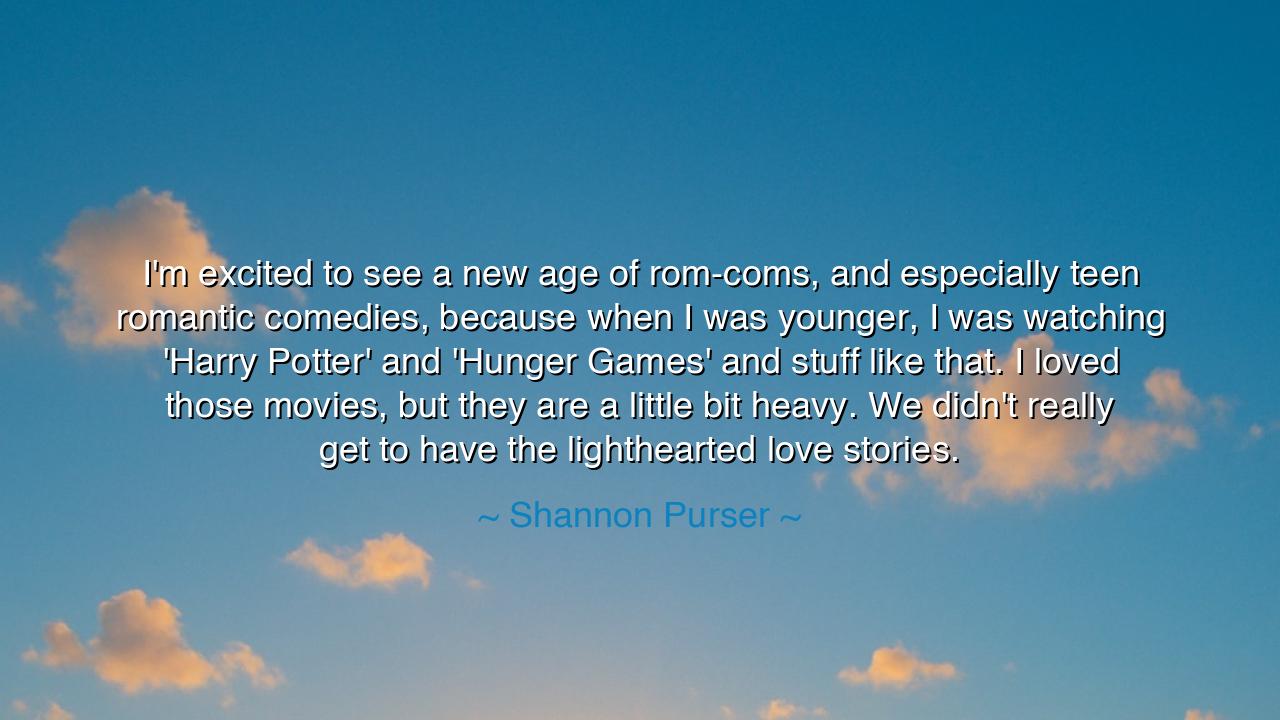
I'm excited to see a new age of rom-coms, and especially teen
I'm excited to see a new age of rom-coms, and especially teen romantic comedies, because when I was younger, I was watching 'Harry Potter' and 'Hunger Games' and stuff like that. I loved those movies, but they are a little bit heavy. We didn't really get to have the lighthearted love stories.






Hear the heartfelt words of Shannon Purser, who gave voice to the longings of youth when she said: “I’m excited to see a new age of rom-coms, and especially teen romantic comedies, because when I was younger, I was watching Harry Potter and Hunger Games and stuff like that. I loved those movies, but they are a little bit heavy. We didn’t really get to have the lighthearted love stories.” At first, these words seem but a reflection on film. Yet within them lies a deeper yearning: the need for balance, the hunger for joy, and the eternal truth that humanity cannot live on struggle alone, but also requires laughter, tenderness, and love.
For the romantic comedy, dismissed by some as frivolous, has always held a sacred place in the human heart. Where war and conflict weary the spirit, stories of love rekindle hope. Where darkness presses in, the light of affection and humor reminds us of our humanity. Purser’s lament is that her youth was shaped by films of conflict—Harry Potter, with its battles against evil, and The Hunger Games, with its world of oppression and survival. These were stories of weight and shadow, necessary in their lessons but heavy on the heart. What was missing were the lighter tales—the gentle reminder that love, too, can be an adventure worthy of its own story.
History has shown the same rhythm. In the years after great wars, people have often turned to lighthearted theater, song, and film. After the Second World War, when nations were scarred and weary, musicals and romances flourished in Hollywood. Audiences, tired of hardship, longed to laugh, to dance, to watch love bloom again. These stories did not erase the memory of sorrow but gave healing, offering the soul a chance to rest in joy. So too does Purser’s hope for a revival of teen rom-coms echo this timeless truth: in every generation, young people need stories that let them dream of love, not only struggle.
There is also wisdom here about the shaping of the young heart. The stories we consume as children and teens do not pass through us without leaving their mark—they teach us how to see the world, how to dream, how to hope. When all stories are heavy, youth may come to believe that life itself is only trial and war. But when love stories are offered, they learn that gentleness and joy also have a place, that affection is as noble as courage, and that laughter is as healing as victory. Purser’s longing is for balance: not to replace the epics of conflict, but to complement them with tales of tenderness.
Consider also the words of the poet Ovid, who in ancient Rome wrote not only of gods and wars, but of love’s games, delights, and sorrows. His writings reminded the world that even in the grandeur of empire, the matters of the heart were worthy of art. And so it has always been—the greatest civilizations remembered not only for their heroes of battle, but also for their stories of lovers, dreamers, and fools.
The meaning of Purser’s reflection, then, is this: a culture must nourish its young not only with lessons of endurance and strength, but with visions of joy, affection, and the playful beauty of love. A rom-com, though light, carries great weight in shaping the heart, teaching youth that life is not only survival but also delight. It allows them to believe in happy endings, even as they prepare for the challenges of reality.
Therefore, my child, learn this: do not scorn the lighter stories, for they are medicine to the soul. Watch them, share them, and let them remind you that hope and love are as vital as strength and courage. In your own life, do not dwell only on struggle and ambition, but make room for laughter, kindness, and simple joys. For the spirit that knows only heaviness will grow weary, but the spirit that embraces love will endure.
So let Shannon Purser’s words endure as a guide for generations: “We didn’t really get to have the lighthearted love stories.” May you seek them out, treasure them, and create them, whether in art or in life. For in the balance of shadow and light, struggle and romance, war and love, lies the fullness of what it means to be human.






AAdministratorAdministrator
Welcome, honored guests. Please leave a comment, we will respond soon